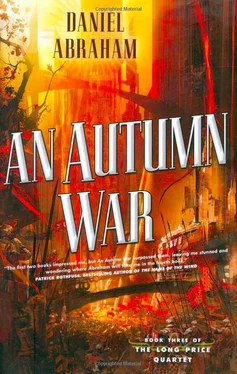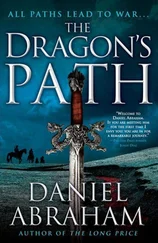Daniel Abraham - Autumn War
Здесь есть возможность читать онлайн «Daniel Abraham - Autumn War» весь текст электронной книги совершенно бесплатно (целиком полную версию без сокращений). В некоторых случаях можно слушать аудио, скачать через торрент в формате fb2 и присутствует краткое содержание. Жанр: Фэнтези, на английском языке. Описание произведения, (предисловие) а так же отзывы посетителей доступны на портале библиотеки ЛибКат.
- Название:Autumn War
- Автор:
- Жанр:
- Год:неизвестен
- ISBN:нет данных
- Рейтинг книги:4 / 5. Голосов: 1
-
Избранное:Добавить в избранное
- Отзывы:
-
Ваша оценка:
- 80
- 1
- 2
- 3
- 4
- 5
Autumn War: краткое содержание, описание и аннотация
Предлагаем к чтению аннотацию, описание, краткое содержание или предисловие (зависит от того, что написал сам автор книги «Autumn War»). Если вы не нашли необходимую информацию о книге — напишите в комментариях, мы постараемся отыскать её.
Autumn War — читать онлайн бесплатно полную книгу (весь текст) целиком
Ниже представлен текст книги, разбитый по страницам. Система сохранения места последней прочитанной страницы, позволяет с удобством читать онлайн бесплатно книгу «Autumn War», без необходимости каждый раз заново искать на чём Вы остановились. Поставьте закладку, и сможете в любой момент перейти на страницу, на которой закончили чтение.
Интервал:
Закладка:
"I can't tell if you hate war or love it," Sinja said.
Balasar looked up as if he'd forgotten Sinja was there. His smile was amused and bitter.
"I see the necessity of it," Balasar said. "And sometimes I forget that the point of war is the peace at the end of it."
"Is it? And here I thought it \vas gold and women."
"Those can be the same," Balasar said, ignoring the joke. "'T'here are worse things than enough money and someone to spend it on."
"And glory?"
Balasar chuckled as he stood, but there was very little of mirth in the sound. I Ic put down his bowl and his hands took a rough pose of query, as simple as a child's.
"Do you see glory in this, Sinja-cha? I only see a bad job that needs doing and a man so sure of himself, he's spent other people's lives to do it. I Iardly sounds glorious."
"l'hat depends," Sinja said, dropping into the language of the Galts. "Does it really need doing,"
"Yes. It does."
Sinja spread his hands, not a formal pose, but only a gesture that completed the argument. For a moment, something like tears seemed to glisten in the general's eyes, and he clapped Sinja on the shoulder. Without thinking, Sinja put his hand to the general's, clasping it hard, as if they were brothers or soldiers of the same cohort. As if their lives were somehow one. Far away, something boomed deep as a drum. Something falling. Ildun, falling.
"I'll get you those hostages," Balasar said. "You take care of them for me."
"Sir," Sinja said, and stood braced at attention until the general was gone and he was alone again in the garden. Sinja swallowed twice, loosening the tightness in his throat. The maple swayed, black leaves touched with red.
In a better world, he thought, I'd have followed that man to hell.
Please the gods, let him never reach Machi.
17
The watchmen Kiyan had placed at the tops of the towers began ringing their hells just as the sun touched the top of the mountains to the west. "Traffic stopped in the streets below and in the palace corridors. All eyes looked up, straining to see the color of the banners draped from the high, distant windows. Yellow would mean that a Galtic army had come at last, that their doom had come upon them. Red meant that the Khai had returned. So far above the city, colors were difficult to make out. At least to Nlaati's eyes, the first movement of the great signal cloth was only movement-the banners Hew. It was the space of five fast, shaky breaths before he made out the red. (bah Machi had returned.
A crowd formed at the edge of the city as the first wagons came over the bridge. The women and children and old men of Machi come to greet the militia that had gone out to save the l)ai-kvo. The Dai-kvo and the city and the world. Maati pushed his way in, elbowing people aside and taking more than one sharp rebuttal in his own ribs. The horses that pulled the wagons were blown. The men who rode them were gray-pale in the face and bloodied. The few who still walked, shambled. A ragged cheer rose from the crowd and then slunk away. A girl in a gray robe of cheap wool stepped out from the edge of the crowd, moving toward the soldiers. From where he stood trapped in the press of bodies, Maati could see the girl's head as it turned, searching the coming train of men for some particular man. Even before the first soldier reached her, Nlaati saw how small the group was, how many men were missing.
"Nayiit!" he shouted, hoping that his boy would hear him. "Nayiit! Over here!"
His voice was drowned. The citizens of Machi surged forward like an attack. Some of the men crossing the bridge drew back from them as if in fear, and then there was only one surging, swirling mass of people. 'T'here was no order, no control. One of the first wagons was pushed sideways from the road, the horses whinnying their protest but too tired to bolt. A man younger than Nayiit with a badly cut arm and a bruise on his face stumbled almost into i\laati's arms.
"What happened?" Maati demanded of the boy. "Where's the Khai? I lave you seen Nayiit Chokavi?" A blank stare was the only reply.
The chaos seemed to go on for a day, though it wasn't really more than half a hand. Then a loud, cursing voice rose over the tumult, clearing the way for the wagons. There were hurt men. Men who had to see physicians. Men who were dying. Men who were dead. The people stood aside and let the wagons pass. The sounds of weeping and hard wheels on paving stones were the only music. Maati felt breathless with dread.
As he pushed back into the city, following in the path the wagons had opened, he heard bits and snatches from the people he passed. The Khai had taken the utkhaiem and ridden for Cetani. The Galts weren't far behind. The I)ai-kvo was dead. The village of the Dai-kvo was burned. 'T'here had been a blood-soaked farce of a battle. As many men were dead as still standing.
Rumor, Maati told himself. Everything is rumor and speculation until I hear it from Nayiit. Or Otah-kvo. But his chest was tight and his hands balled in fists so tight they ached when, out of breath and ears ringing, he made his way back to the library. A man in a travel-stained robe squatted beside his door, a tarp-covered crate on the ground at his side.
Nayiit. It was Nayiit. Maati found the strength to embrace his boy, and allowed himself at last to weep. He felt Nayiit's arms around him, felt the boy soften in their shared grief, and then pull away. Maati forced himself to step hack. Nayiit's expression was grim.
"Come in," Nlaati said. "Then tell me."
It was had. The Galts were not on Machi's door and Otah-kvo lived, but these were the only bright points in Nayiit's long, quiet recitation. They sat in the dimming front room, shutters closed and candles unlit, while Nayiit told the tale. Maati clasped his hands together, squeezing his knuckles until they ached. The Dai-kvo was dead. The men whom Maati had known in the long years he had lived in the village were memories now. ITe found himself trying to remember their names, their faces. 't'here were fewer fresh to his mind than he would have thoughtthe firekeeper whose kiln had been at the corner nearest Maati's cell, the old man who'd run the bathhouse, a few others. They were gone, fallen into the forgetfulness of history. The records of their names had been burned.
"We searched. We searched through everything," Nayiit said. "I brought you what we found."
With a thick rustle, he pulled the thick waxed cloth from out of the crate. Two stacks of books lay beneath it, and Maati, squatting on the floor, lifted the ancient texts out one at a time with trembling hands. Fourteen books. The library of the Dai-kvo reduced to fourteen hooks. He opened them, smelling the smoke in their pages, feeling the terrible lightness of the bindings. There was no unity to them-a sampling of what had happened to be in a dark corner or hidden beneath something unlikely. A history of agriculture before the First Empire. An essay on soft grammars. Jantan Noya's Fourth 7i-eatrse on Form, which Maati had two copies of among his own hooks. None of these salvaged volumes outlined the binding of an andat, or the works of ancient poets.
Stone-Made-Soft wouldn't be bound with these. And so StoneMade-Soft wouldn't be bound, because these were all that remained. Maati felt a cold, deep calm descend upon him. Grunting, he stood tip and then began pacing his rooms. His hands went through the movements of lighting candles and lanterns without his conscious participation. His mind was as clear and sharp as broken ice.
Stone-Made-Soft could not be bound-not without years of workand so he put aside that hope. If he and Cehmai failed to hind an andat, and quickly, the Gaits would destroy them all. Nayiit, Liat, Otah, Eiah. Everyone. So something had to be done. Perhaps they could trick the Gaits into believing that an andat had been hound. Perhaps they could delay the armies arrayed against them until the cold shut Machi against invasion. If he could win the long, hard months of winter in which he could scheme…
Читать дальшеИнтервал:
Закладка:
Похожие книги на «Autumn War»
Представляем Вашему вниманию похожие книги на «Autumn War» списком для выбора. Мы отобрали схожую по названию и смыслу литературу в надежде предоставить читателям больше вариантов отыскать новые, интересные, ещё непрочитанные произведения.
Обсуждение, отзывы о книге «Autumn War» и просто собственные мнения читателей. Оставьте ваши комментарии, напишите, что Вы думаете о произведении, его смысле или главных героях. Укажите что конкретно понравилось, а что нет, и почему Вы так считаете.










